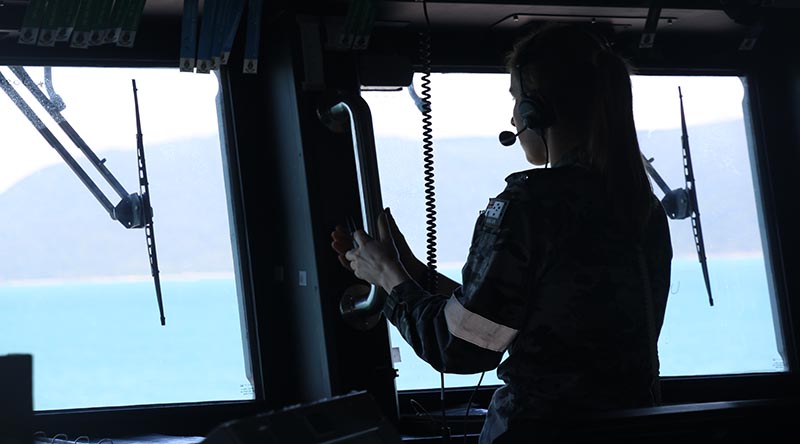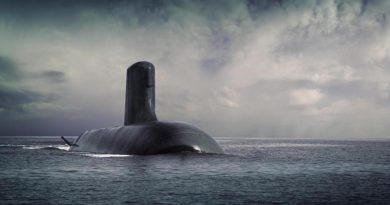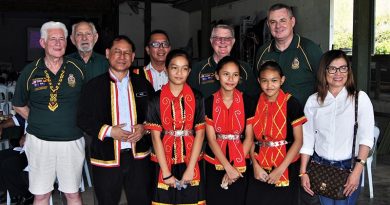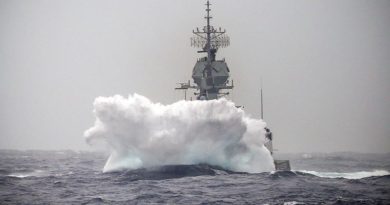No hope of finding helicopter crash victims alive – official update
Share the post "No hope of finding helicopter crash victims alive – official update"

RICHARD MARLES, DEPUTY PRIME MINISTER: Since the accident of the MRH-90 helicopter on Friday night, the activities that have been occurring in the Whitsundays have now revealed significant wreckage from the helicopter. What this evidences is that there was a catastrophic incident and, with every passing hour, it is now clear that any hope of finding Captain Lyon, Lieutenant Nugent, Warrant Officer Laycock and Corporal Naggs alive has been lost. As such, the nature of the activities which are being undertaken in the Whitsundays has transferred from being ones of search and rescue, to an activity of recovery. The families of the four aircrew were notified of this this morning, and I’ve spoken with each of them in the last hour. But I do want to assure them, and assure the nation that the determined recovery effort involving hundreds of Defence Force personnel will continue.
CAPTION: A Royal Australian Navy sailor on the bridge of HMAS Brisbane keeps watch during search operations for the crashed MRH-90 in the vicinity of Lindeman Island during Exercise Talisman Sabre 23. Photo by Leading Seaman Hannah Linsley.
We are all obviously left wondering, naturally, what happened. Foremost in our minds in this moment must be the families of these four men and their teammates. And with them in mind, idle speculation is obviously harmful. But there will be a full investigation and we will come to understand exactly what happened and learn the lessons from it. But what we do know is that Defence exercises are serious. They carry risk and, as such, they are dangerous. But they are so important. These exercises have played a critical part in providing for the collective security and peace of the region in which we live. And so the loss of these four men is as significant and meaningful as the loss of anyone who has worn our nation’s uniform. If it is as we imagined it to be, they died on Friday night making a difference.
Defence is a huge enterprise and yet at another level, it is a small community. People work very closely together and know each other. Indeed, in my immediate Defence family, there are people who knew some of the aircrew and I know how acutely they are feeling this moment. And there will be people across the Defence Force who are feeling it with them. Right now, we are thinking very much of all of them. But the people who are in most pain in this moment are the families of these four men. They have lost loved ones, persons most cherished, and they face the prospect ahead of a life with an unfillable hole. To them, we are so deeply sorry and we are so deeply grateful. And they have every right to feel an intense sense of pride. And in the midst of the inadequacy of these words, I want them to know that they stand in the warm embrace of the entire nation.
GENERAL ANGUS CAMPBELL, CHIEF OF THE DEFENCE FORCE: My thoughts and prayers go out to the families, and to the friends, and to the regiments. And I’d ask all Australians to pause for a moment and think about that service offered and the loss suffered, and to support and care for these families and for our ADF personnel throughout the country. Their service matters, and what they do together matters for Australia.
The recovery effort is ongoing, and it’s got the full backing of the entire multinational effort that is present in Exercise Talisman Sabre. We deeply appreciate the assistance being offered, especially by the United States and by Canada, as well as by the civil agencies and the Queensland Police Service. This effort will continue. We’ll be bringing our mates home to their families and to their regiments.
It’s not easy being in the ADF today or being associated as a person who is connected in some way to this loss. Please take care of yourself, take care of others and think and support our families. Thank you.
JOURNALIST: What can you tell us about the recovery operation, how challenging it’s proving to be?
GENERAL CAMPBELL: It’s in an area of the waters around the Whitsunday Islands where there are quite strong currents and tidal movements, and with waters that move below the depths of a standard diving operation. So, this means that we’ve had to use sonar equipment to identify pieces of the wreckage, but we’ll also have to use divers and some specialist divers to support. This activity has been ongoing and will continue. It is also subject to just the standard nature of the weather at the time and of the visibility in the water. It’s not an easy operation.
JOURNALIST: General Campbell, did you sign off on the return of these aircraft to service after the incident in March? And if not you, who did?
GENERAL CAMPBELL: I am not the senior airworthiness authority in Defence, that is the Chief of the Air Force, quite appropriately. I’m not going to speak on issues related to what ultimately may be part – may be part – of an air accident investigation. There is going to be an investigation, as there always would be, and it will be utterly thorough and consider all factors. But we must not speculate and must not in any way influence or distort the presumptions of that investigation. It will have complete and full authority to review what has happened, identify the cause of this accident and make recommendations to ensure it never occurs again.
MARLES: Can I just add to that. These helicopters were certified to fly. There will be a full investigation, as General Campbell has just said, and we will come to understand exactly what has happened here, and what lessons we need to learn from this. In the meantime, our fleet of MRH-90s have been grounded and they won’t fly again until we understand what has happened and we have modified or acted accordingly.
JOURNALIST: Now that the Taipans have been grounded, where does this leave the Defence Force in terms of capability? And are you able to get the Black Hawks, for example, a little earlier?
MARLES: Well, obviously it does impact capability, but we will have the MRH-90s grounded until we understand what’s happened here and whatever issues there are can be dealt with. I wouldn’t want to raise expectations around having the Black Hawks in service sooner. We are in the process of transitioning to Black Hawks pretty well as of now. But it is both a question of having the airframes come to Australia, but also a question of making sure that all the appropriate training and credentialing is done for those who operate the Black Hawks so that that can be done in a safe way. And that needs to be done with all the thoroughness that you would expect. The MRH-90s were due to come out of service at the end of next year. We will move through the process of putting Black Hawks into service as quickly as we can, but as thoroughly as we need to, and we will not be flying the MRH-90s until we understand what has happened.
JOURNALIST: From what’s been seen from the wreckage so far, is there anything that you can say about the circumstances of the crash? For example, was there an explosion on the aircraft?
GENERAL CAMPBELL: We can’t go into that and this is rightly the purview of an air accident investigation which will be thorough in its efforts.
MARLES: The only point I’d make is that it is clear there was a catastrophic impact and that forms part of why we are now transferring this from an activity of search and rescue to one of recovery.
JOURNALIST: Will the Government now release documents about the safety of the helicopters that were undertaken after previous incidents?
MARLES: Are you referring to the production from the Senate? Yeah. Look, we wanted to make sure in terms of providing documents to the Senate about the incident at Jervis Bay, to make sure that we are providing the full story in the aftermath of the full investigation, in respect of that incident. We’ve written to the Senate making clear that position and accordingly, those who have sought the production of documents have increased the time for that to be provided until November of this year. And obviously we’ll comply with that.
JOURNALIST: Will you release the full story of this incident, then? Do you guarantee that the Government will release everything about what happened on the weekend?
MARLES: We’re committed to transparency. But let’s be clear, what I’ve made clear right now is that there will be a full investigation of what has happened. And we will come to understand, as a result of that, exactly what occurred and we will learn the lessons from that. And there will be transparency about all of that.
JOURNALIST: On the investigation that will now ensue, and the length of that, is it likely that the Taipan fleet will ever be used again?
MARLES: I’m not going to speculate on that, other than to say the investigation is going to be thorough. We need to understand what occurred. If there are steps which then need to be taken, we need to take those steps and until all of that has happened, the MRH-90s will not fly.
JOURNALIST: You’ve said, and others said that the helicopter ditched. Am I right to interpret that then ruled out the possibility of pilot error or disorientation that caused the helicopter to crash?
MARLES: Well, I think what you should take from what I have said today is that there was a catastrophic impact of the helicopter when it hit the water. That’s what occurred. There will be a full investigation and we shouldn’t be speculating about the accident beyond the fact that it was catastrophic, we know that from the wreckage which has been retrieved. We shouldn’t be speculating about this until that investigation occurs.
JOURNALIST: How much of the wreckage has been recovered and how much of it has just been seen by divers and by that sonar equipment? And how long do you expect this operation will take? I know you’ve talked about the complexity, but how long do you expect?
GENERAL CAMPBELL: So, a portion of the airframe has been recovered, but there is the greater majority not yet recovered and I’m not sure how long it will take. Every appropriate resource and effort is being applied and we’ve got great support from civil and foreign military agencies and organisations. So, it will be done as quickly as possible, but thoroughly, as it needs to be, both in terms of consideration to support our families, but also that investigation that we’ll wish to recover as much of the airframe as possible.
JOURNALIST: DPM, is there a real possibility that we just will never find out what actually happened? Given you the words you’re saying around a catastrophic impact, the fact that it’s understood the pilot didn’t have a chance to get a radio message out, the witnesses who were in the other helicopter were probably focused on their task at hand rather than what was happening next to them – is there things like a black box on board that we’re trying to look for, or anything like that?
MARLES: Well, I will pass over to General Campbell because some of the details he’ll know. All I can obviously say is that there is going to be the most thorough investigation there can possibly be. And in saying that, I am confident that we will come to understand what happened here. But the commitment that we must make and are making right now is that investigation will be thorough and it will take as long as it takes.
GENERAL CAMPBELL: Please, I would ask, let’s not speculate. The investigation, like all air accident investigations, will scrutinise every aspect of this event and we will be seeking to recover as much as possible of the airframe and for as long as required to assist in that investigation. There are data recording systems, so that will be of assistance, but the material and mechanical state of the airframe, as in other air investigations, can be meticulously put back together and hence understood. But that’s for investigators. It’s not time now for careless or speculative comments. Thank you.
JOURNALIST: To the point that both of you have just made, you’ve said that this is going to be a thorough investigation, what does the process look like from here in terms of that investigation? Because I imagine this is different to, say, a civil aviation investigation?
MARLES: Well, I mean obviously the first steps are to engage in the recovery effort, which we are doing with determination, and that will be thorough as well. From there, we will make sure that there is a full investigation established to make sure that we understand what has occurred.
JOURNALIST: How many of these helicopters are now left in the fleet?
MARLES: Well, we’ve been operating 47 over the course of the last decade, so that’s really the answer to the question. I mean, at any given point in time, with any platform that the Defence Force operates, there are certain numbers that operate and certain numbers that are in service.
JOURNALIST: Do we know how many were in service, prior to Friday?
GENERAL CAMPBELL: I don’t have that specific number with me, but there’s a standard deep maintenance cycle, intermediate maintenance cycle, daily maintenance cycle and an operating fleet. And that’s just quite normal in the way we operate all of our major platforms.
JOURNALIST: Is there a particular person leading the investigation? What resources will be made available to them? How big is their team?
MARLES: It’s early days. I mean, right now the focus is on recovery and that’s where the effort’s at.
JOURNALIST: General Campbell, I appreciate you not wanting to speculate, not wanting anyone to speculate, but can I just ask you to comment on some reports that locals in the Whitsunday could hear a Mayday call? Are you aware of that?
GENERAL CAMPBELL: Anything to do with the investigation is easily distorted, or in perception, by any comment that I might make or any other official, or indeed by the media. So, it’s really important that the investigators go into this without presumption and without suggestion from any comment. So, they will have that.
JOURNALIST: Just on risk mitigation and not speculating about what’s happened in this particular crash. Will the ADF look at assessing its risk mitigation factors? Given that the Taipans have had a history of issues?
GENERAL CAMPBELL: We will always take into account, in an investigation of this kind, the question of; what do we learn from it, how do we understand our risk management processes. That’s a given in these types of investigations.
JOURNALIST: Given the catastrophic nature of the crash, are you confident you’ll be able to recover the bodies of the men?
GENERAL CAMPBELL: We’re going to do everything possible to bring our mates home to their families.
JOURNALIST: What’s happening with the rest of operation Talisman Sabre?
GENERAL CAMPBELL: The exercise is continuing, albeit it in some parts, particularly in the vicinity of the incident site, adjusted or changed in a way that enables the recovery effort to continue at scale and then appropriately redirects exercise activity and planning into the next stages of that activity.
.
.

.
.
Share the post "No hope of finding helicopter crash victims alive – official update"





